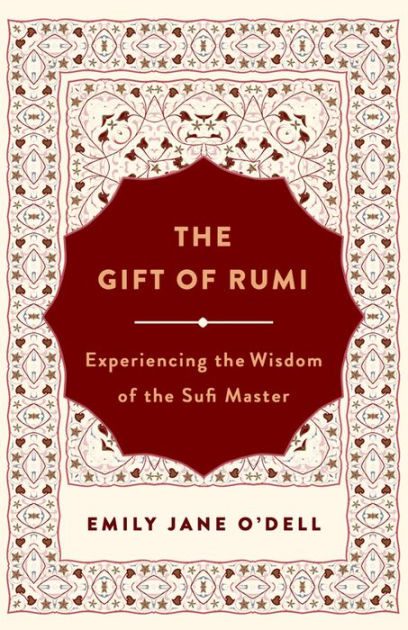At this moment in my life, I suffer from an abundance of offers of free books. Well, not actually free. The cost is a promise to review it. Mostly I decline these offers. The truth is the stack of books I want to read for my purposes is dangerously high. And I want to get the stack lower, not add unnecessarily to it.
For that reason, I tend to keep close to my subject when I agree to review a book. Zen. That’s pretty much it. So, when the good people at St Martin’s asked if I wanted to read a book about Rumi and his poetry, I surprised myself by immediately agreeing.
That’s the problem with Sufism. It’s all heart. And intuition. And dreams. It’s about intimations of another world tucked into this one.
The book is The Gift of Rumi: Experiencing the Wisdom of the Sufi Master.” As I noted, published by St Martin’s, this year (2022)
The author Emily Jane O’Dell is one of those shockingly brilliant sorts. She alludes in passing to having five Ivy League degrees. Mentioned not in the least in a bragging sense. it’s just part of a full resume. In what is ultimately a very intimate book she also mentions struggles with depression and anorexia. Her principal academic interests are important to know, she is an authority on Islam and Sufism. But she brings her life into this book, so we get passing allusions to Indonesian gamelan, yoga, and tai-chi. You could say this book is her dream record of the spiritual life.
And it is an invitation.
Come closer, closer! How much more of this highway robbery?
Since you are me and I am you,
How much more of this
You bring you and me being me?
While she is very much present in the book, Dr O’Dell is really presenting us with Rumi. Introducing us to the real Rumi. The, if I may say, living Rumi.
She tells us Rumi’s poetry “did not vault to mass popularity (here in the English speaking West) until after Robert Bly gave a copy of Arberry’s translations to Coleman Barks in the 1970s. Because Barks was not familiar with Persian or the Qur’an, his collections are not necessarily accurate representations of Rumi’s own words and ideas.”
 She then goes on to note the criticisms of Barks and others who have followed him producing versions of Rumi without the deeper contexts of Rumi’s life and faith. But, and I found this both generous and telling, she also notes how Barks and those others have opened doors to Rumi for, by her guess, perhaps millions of people.
She then goes on to note the criticisms of Barks and others who have followed him producing versions of Rumi without the deeper contexts of Rumi’s life and faith. But, and I found this both generous and telling, she also notes how Barks and those others have opened doors to Rumi for, by her guess, perhaps millions of people.
She adds “in fact, one of my Iranian colleagues recently told me that Barks’ freewheeling translations helped ‘unlock’ the original for him and inspired him to return to reading Rumi in Persian.”
And she acknowledges there is more to Rumi than we get from Barks and those others. O’Dell’s intention with this book is to “restore and emphasize the Islamic and mystical contexts of Rumi’s poetry.” She does that And more. She gives us a wonderful introduction to Rumi’s life, and very much shares the context of his life. And by throwing in her life as well, she shows us hints of what our lives can be.
And along the way she gives us his poetry.
You have become the soul for the soul of this servant.
In the darkness of unbelief, you have become the candle of faith.
In my heart, you have become a singer of melodies.
In my head, you have been dancing like wine.
With the poetry she provides the context to understand the mystical path it is describing.
O’Dell weaves in her own spiritual journey. Or, an important part of it. She does this by threading through the book her account of her forty day retreat in Istambul under the guidance of a Mevlevi Shaykh. The Mevlevi Order is the Sufie order that flows from Rumi and his teaching. A Shaykh is a spiritual director within the tradition.
Her stories are intimate and true. Being given the task of making coffee is a wonderful description that anyone who ha taken on spiritual practice with a real teacher of the intimate way will recognize. Mundane. And sacred. And maybe laugh in recognition at how hard the simple can be. Similar anecdotes involving cook an omelet and learning the “turn,” Mevlevi Sufism’s unique spiritual practice that we usually call Whirling are just plain inviting.
O’Dell tells us how she patterned her book on traditional medieval Sufi manuals. I was much taken with this in part as I’ve been delving into our Zen training manuals for a writing project of my own. I could feel the complementarity of the whole thing, the “eye of Zen and it’s cultivation, and the “heart” of Sufism, and it’s cultivation.
Her book totally works. It weaves Rumi’s life and teachings while it invites you and me along into the dance. And she tells us what the dance is. “Rumi continually implores us to awaken – to live consciously so that each moment can be an experience and offering of love.
It is a powerful invitation. Rumi is a muslim. O’Dell makes sure we understand that and what that means. And, she lets Rumi sing the deeper wisdom to us, as well.
Know truly the lover: he is not a Muslim.
In his creed, there is neither unbelief nor faith.
In lovee, there is neither body nor intellect nor heart nor soul.
Anyone who has not become like this – is not a lover.
This path is astonishingly ordinary – and astonishingly real. The coffee. The omelet. Her shaykh, whom she refers to simply as Baba, tells her and us, “‘Listen: life is like a bird with two wings,’ he said. ‘One wing is the material world – money, daily-life concerns – the other is love, ecstasy, and meditative bliss. To fly we need both.'”
Here we get a fully realized introduction to the Sufi way that Rumi actually taught, and, and this is so wonderful, what we can access today. Through his writings. And through his spiritual heirs.
We also get a peek at a contemporary woman who has found for herself all the parts she’ll need for a lifetime journey. I hope I live long enough to see how this turns out as Emily O’Dell continues to marinade in the great authentic way.
What a lovely book.
Do yourself a favor. Buy it. Do yourself another favor. Read it.













